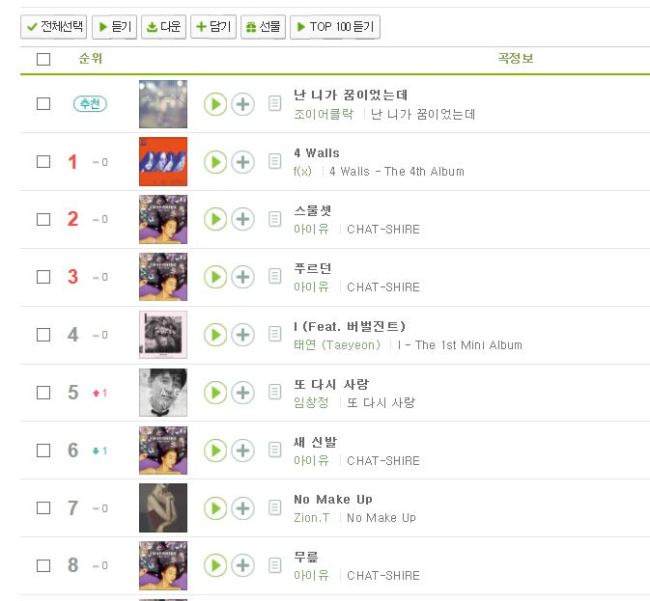Can you trust the K-pop charts?
Korea’s online music charts under fire for unfair practices, suspected chart-rigging
By 원호정Published : Oct. 27, 2015 - 17:48
This is the first in a two-part series examining issues pertaining to Korea’s digital music industry. – Ed.
Ever wondered why K-pop has so many chart-topping debuts or new releases? How trustworthy do you think the K-pop charts are?
According to some industry insiders and experts, the online charts are prone to manipulation.
Ever wondered why K-pop has so many chart-topping debuts or new releases? How trustworthy do you think the K-pop charts are?
According to some industry insiders and experts, the online charts are prone to manipulation.

A major issue with the charts today is “hoarding,” efforts allegedly coordinated by fans or brokers to push certain songs up the charts by streaming simultaneously, especially during off-peak hours and particularly upon release.
At the center of the problem is, according to professor Kim Min-yong of Kyung Hee University in Seoul, the existence of real-time charts, which are refreshed approximately every hour. These charts allow for 24 “No. 1 songs” every day.
“If you hit No. 1 just for one hour, you can claim that you had a No. 1 song,” Kim said in a recent forum in Seoul.
Those chart scores are taken into consideration when deciding rankings on music programs, or awards at the end of the year. According to writers for major radio programs who asked to remain anonymous, chart rankings also play a part in determining which artists are chosen to make appearances as well.
The problem of hoarding was brought into the public spotlight recently after a media outlet revealed the scores of suspicious user accounts on Melon, the largest music service provider, allegedly used for hoarding.
The issue was first brought up in 2013. Then four of K-pop’s largest entertainment agencies -- YG, SM, JYP and Star Empire -- asked for a state investigation of “brokers” who offered to manipulate the charts for large fees. The case was thrown out due to insufficient evidence.
Also in dispute are the “recommended” songs that appear on top of the charts on every major streaming platform.
The problem stems from the fact that listeners usually stream all the songs they see on the Top 100 charts rather than choosing specific songs to listen to, according to Kim. He said that in choosing “all tracks” listeners inadvertently streamed the “recommended” song as well, pushing up the recommended track’s streaming numbers.
The contention is that streaming platforms are rigging the system in order to push certain songs up the charts, allowing the companies behind those artists to gain more streaming revenue and opportunities for media appearances.
According to data provided by Kim, 57 percent of songs recommended by Melon, as of August 2015, were distributed by partner company Loen Entertainment, while 42 percent of songs recommended by Genie were distributed by partner company KT Music.
Loen Entertainment and Mnet.com’s parent company CJ E&M agree with the overall idea that “recommending” songs could warp the charts to a certain degree, but insist on calling the function a curation service that helps customers discover new songs.
“We want to curate new songs and introduce them to our users,” said Park Jin-kyu, head of Loen Entertainment’s corporate relations team.
“We’re discussing how we can do that without creating controversy over fairness. We understand that the artists who take over that small privileged spot seem like they have power. We’re testing different mechanisms that will allow us to recommend songs based on our users’ listening history,” he said.
On Oct. 21, Mnet.com became the first platform to issue an official statement pledging concrete change. In the statement, Mnet.com’s parent company CJ E&M stated they would “remove the ‘package-deal recommendation service’ from (its) music service soon” and “aggressively pursue an alternative to real-time charts, which leads to streaming hoarding.”
Mnet.com said it would “actively reflect the criticisms of music production agencies to lead improvements in the music market environment and evolve Mnet.com to a symbiotic platform” as the “second-largest music service provider,” CJ E&M music division head Ahn Suk-jun said in the statement.
Meanwhile, Loen Entertainment told The Korea Herald through an official statement that it had no plans to eliminate the “recommended” tracks from its Melon charts, saying that “Melon is currently developing algorithms that would prevent hindering fairness or reason through partiality,” and that the service would “present a meticulous song recommendation service customized for individual listening preferences within this year or early next year.”
As for the hoarding behavior by enthused fans or brokers, Loen said, “Since two years ago, Melon has operated a data analysis team that has run a filtering system to block abnormal data, and has filtered over 1 million abnormal IDs.” According to the statement, abnormal streaming practices are already being addressed through this system.
Still, it said, “Melon will continue to develop advanced response filtering systems in the future.”
According to the “Digital Music Report 2015” released by the International Federation of the Phonographic Industry, South Korea’s music market grew 19.2 percent in 2014, with 91 percent of total digital revenues last year coming from subscription streams.
By Won Ho-jung (hjwon@heraldcorp.com)








![[Graphic News] More Koreans say they plan long-distance trips this year](http://res.heraldm.com/phpwas/restmb_idxmake.php?idx=644&simg=/content/image/2024/04/17/20240417050828_0.gif&u=)
![[KH Explains] Hyundai's full hybrid edge to pay off amid slow transition to pure EVs](http://res.heraldm.com/phpwas/restmb_idxmake.php?idx=644&simg=/content/image/2024/04/18/20240418050645_0.jpg&u=20240419100350)







![[KH Explains] Hyundai's full hybrid edge to pay off amid slow transition to pure EVs](http://res.heraldm.com/phpwas/restmb_idxmake.php?idx=652&simg=/content/image/2024/04/18/20240418050645_0.jpg&u=20240419100350)

![[Today’s K-pop] Illit drops debut single remix](http://res.heraldm.com/phpwas/restmb_idxmake.php?idx=642&simg=/content/image/2024/04/19/20240419050612_0.jpg&u=)